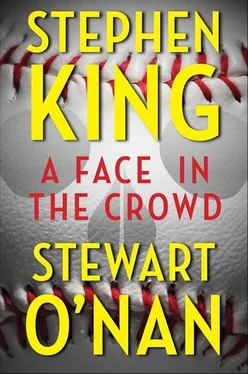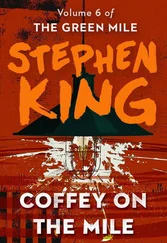There was nothing remarkable in his obituary, just the usual survived by and funeral home info. Evers had had absolutely nothing to do with the drunk old butcher’s demise, just the bad luck to be his victim. Exonerated, that night he raised an extra glass or four to Dr. Young. He ordered in, but it took forever, arriving after he was well in the bag. CSI turned out to be one he’d seen before, and all the sitcoms were stupid. Where was Bob Newhart when you needed him? Evers brushed his teeth, took two of Ellie’s Ambiens, then stood swaying in front of the bathroom mirror, his eyes bleeding. “Give me a liver long enough,” he said, “and I’ll move the fucking world.”
He slept late again, recovering with instant coffee and oatmeal, and was pleased to see in the paper that the Sox were coming in for a big weekend series. He celebrated the opener with steak, setting the DVR to capture whatever malevolent spirit his past might vomit up. If it happened, this time he’d be ready.
It did, in the seventh inning of a tie game, on a key play at the plate. He would have missed it if he’d gone off to do the dishes, but by then he was poised on the edge of the sofa, totally into the contest and concentrating on every pitch. Longoria doubled to the gap in left center, and Upton tried to score from first. The throw beat him but was wide, up the first baseline. As Sox catcher Kelly Shoppach lunged toward home with a sweep tag, directly behind the screen a scrawny, freckle-faced boy not more than nine rose from his seat.
His haircut was what used to be called a Dutch boy, or, if you were taunting this particular fellow at school, a soup bowl. “Hey, Soup!” they used to hound him in gym, pummeling him, turning every game into Smear the Queer. “Hey, Soupy, Soup, Soupy!”
His name was Lester Embree, and here in the shadowy Trop he wore the same threadbare red-and-blue striped shirt and bleached, patched-at-the-knees Tuffskins he always seemed to have on that spring of 1954. He was white but he lived in the black part of town behind the fairgrounds. He had no father, and the kindest rumor about his mother said she worked in the laundry at St. Joe’s hospital. In the middle of the school year he’d come to Shrewsbury from some hick town in Tennessee, a move that seemed foolish, a dunderheaded affront to Evers and his cadre of buddies. They delighted in imitating his soft drawl, drawing out the halting answers he gave in class into Foghorn Leghorn monologues. “I say, I say, Miss Pritchett, ma’am, I do declayuh I have done done dooty in these heah britches.”
On-screen, Upton leapt to his feet, looking back at the sprawled catcher and signaling safe just as the umpire punched the air with a clenched fist. A different camera zoomed out to show Joe Maddon charging from the dugout in high dudgeon. The sellout crowd was going wild.
In the replay—even before Evers paused and ran it back with the clicker—Lester Embree and his doofy bowl cut were visible above the FOX 13 ad recessed into the wall’s blue padding, and then, as Upton clearly evaded the tag with a nifty hook slide, the quiet boy Evers and his friends had witnessed being pulled wrinkled and fingerless from Marsden’s Pond rose and pointed one fish-nibbled stub not at the play developing right in front of him, but, as if he could see into the air-conditioned, dimly lit condo, directly at Evers. His lips were moving, and it didn’t look like he was saying Kill the ump .
“Come on,” Evers scoffed, as if at the bad call. “Jesus, I was a kid .”
The TV returned to live action—very lively, in fact. Joe Maddon and the home plate ump stood toe to toe and nose to nose. Both were jawing away, and you didn’t have to be a fortune-teller to know that Maddon would soon be following the game from the clubhouse. Evers had no interest in watching the Rays’ manager get the hook. He used his remote to run the picture back to where Lester Embree had come into view.
Maybe he won’t be there, Evers thought. Maybe you can’t DVR ghosts any more than you can see vampires in a mirror .
Only Lester Embree was right there in the stands—in the expensive seats, no less—and Evers suddenly remembered the day at Fairlawn Grammar when old Soupy had been waiting at Evers’s locker. Just seeing him there had made Evers want to haul off and paste him one. The little fucker was trespassing, after all. They’ll stop if you tell ’em to , Soupy had said in that crackerbarrel drawl of his. Even Kaz will stop.
He’d been talking about Chuckie Kazmierski, only no one called him Chuckie, not even now. Evers could attest to that, because Kaz was the only friend from his childhood who was still a friend. He lived in Punta Gorda, and sometimes they got together for a round of golf. Just two happy retirees, one divorced, one a widower. They reminisced a lot—really, what else were old men good for?—but it had been years since they talked about Soupy Embree. Evers had to wonder now just why that was. Shame? Guilt? Maybe on his part, but probably not on Kaz’s. As the youngest of six brothers and the runt of their scruffy pack, Kaz had had to fight for every inch of respect. He’d earned his spot as top dog the hard way, with knuckles and blood, and he took Lester Embree’s helplessness as a personal insult. No one had ever given him a break, and now this whingeing hillbilly was asking for a free pass? “Nothing’s free,” Kaz used to say, shaking his head as if it was a sad truth. “Somehow, some way, somebody got to pay.”
Probably Kaz doesn’t even remember, Evers thought. Neither did I, till tonight. Tonight he was having total recall. Mostly what he remembered was the kid’s pleading eyes that day by his locker. Big and blue and soft. And that wheedling, cornpone voice, begging him, like it was really in his power to do it.
You’re the one Kaz and the rest of them listen to. Gimme a break, won’t you? Ah’ll give you money. Two bucks a week, that’s mah whole allowance. All Ah want’s to get along .
Little as he liked to, Evers could remember his answer, delivered in a jeering mockery of the boy’s accent: If’n all you want’s to git along, you git along raht out of heah, Soupy. Ah don’t want yoah money, hit’s prob’ly crawlin wit’ fag germs .
A loyal lieutenant (not the general, as Lester Embree had assumed), Evers immediately brought the matter to Kaz, embellishing the scene further, laughing at his own drawl. Later, in the shadow of the flagpole, he egged Kaz on from the nervous circle surrounding the fight. Technically, it wasn’t a fight at all, because Soupy never defended himself. He folded at Kaz’s first blow, curling into a ball on the ground while Kaz slugged and kicked him at will. And then, as if he’d tired, Kaz straddled him, grabbed his wrists, and pinned his arms back above his head. Soupy was weeping, his split lip blowing bloody bubbles. In the tussle, his red-and-blue striped shirt had ripped, the fishbelly skin of his chest showing through a fist-size hole. He didn’t resist as Kaz let go of his wrists, took hold of the tear in his shirt with both hands, and ripped it apart. The collar wouldn’t give, and Kaz tugged it off over Soupy’s ears in three hard jerks, then stood and twirled the shreds over his head like a lasso before flinging it down on Soupy and walking away. What astonished Evers, besides the inner wildness Kaz had tapped and the style with which he’d destroyed his opponent, was how fast it all happened. In total, it had taken maybe two minutes. The teachers still hadn’t even made it outside.
When the kid disappeared a week later, Evers and his pals thought he must have run away. Soupy’s mother thought differently. He liked to go on wildlife walks, she said. He was a dreamy boy, he might have gotten lost. There was a massive search of the nearby woods, including baying teams of bloodhounds brought from Boston. As Boy Scouts, Evers and his friends were in on it. They heard the commotion at the dam end of Marsden’s Pond and came running. Later, when they saw the eyeless thing that rose dripping from the spillway, they would all wish they hadn’t.
Читать дальше











